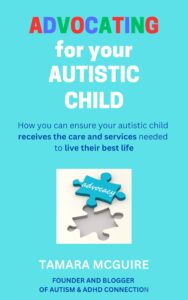Our children with autism and ADHD have needs and rights to ensure they are receiving the best education, medical and other services they require. Early intervention is key to helping them be successful in life. Therefore, as parents and caregivers, we need to help them through advocacy. But how can you be an effective advocate for your autistic child?
I understood when our son J was diagnosed with Asperger’s Syndrome (now part of the autism spectrum disorder) that I would need to become his number one advocate until he was an adult (and maybe after that too depending on how well he can self-advocate in the future). I have found this is especially true with our education system. Although he has attended a great school system and had some amazing teachers and speech therapists, I still have had to step in many times to insist that he obtain the services required per his individualized education plan (IEP).
One of my biggest challenges was J’s first grade teacher. For the first half of the year, I had to contact her several times about not following J’s IEP. For example, she kept disciplining J by taking away recess. J has ADHD, and he needed to get out and run and play during recess to help him regulate during the school day. That is why I had it explicitly written in his IEP that recess could not be taken away. Yet, week after week, she kept taking his recess away. When contacting her directly didn’t work, I finally had to pull in the special services director to ensure she would follow his IEP. It seemed like a minor thing, but it was big for J. After that, his behavior was a bit better in class because he had that time to blow off some steam during the day.
So how can you be an effective advocate for your autistic child?

1. Understand your child’s needs
No one knows your child like you do. Yet, we need to become more familiar with the education requirements for our children and learn more about medical services and procedures to understand how they will benefit our child. Take some time to research these, so you know what your child needs from providers. It will help you advocate for them better.
2. Know your child’s rights
Your child’s school is supposed to provide you with the list of rights for children with disabilities for education. In the United States, most of these fall under the Individuals with Disabilities Education Act (IDEA). Become familiar with them and the alternative actions you can request to ensure your child is receiving the services required under these rights.
3. Increase your knowledge of autism and ADHD
To know what to advocate for your autistic child, you need to know as much as you can about autism and ADHD. Learn about treatments, effective behavior interventions, nutrition and everything else. While you don’t need to earn a degree, you need to know a lot to ensure you are asking for the services and help that your child needs.
4. Be proactive
Being an advocate for your autistic child means being proactive and not reactive. Our children usually cannot advocate for themselves, so they need us to step in for them. Don’t wait until a situation gets bad before you intervene. If you see something your child needs, ask for it right away. Being reactive only delays the help your child needs and causes much more stress for both you and your child.

5. Do your prep work
Before a case conference meeting with your child’s school to discuss his IEP, do your prep work. Go through their rights again to ensure you know what the school should be providing. Look at the education standards and requirements for the next grade to understand what your child needs to accomplish to be able to progress in the next year.
If you are obtaining a new medical service or taking the next step on a treatment plan, research it so that you know what to expect from your child’s provider.
Preparation is key to obtaining the services your child needs!
6. Create a master plan for your child
What is your vision for your child’s life? What goals are you and your child setting? This will help you develop a long-term plan for your child and better understand what they need to learn to accomplish those goals. Having this in place will help guide you in your discussion with your child’s school, healthcare providers and others.
7. Be outspoken
Make your and your child’s voices heard. Don’t allow others to be speak for you or your child. You’ve done your research and know what your child needs. Speak up – it’s the best way to advocate for your child.

8. Clearly communicate
Be clear when you discuss your child’s needs and your expectations. If you need to provide a written summary of your request to be sure others have heard you, don’t hesitate to do so. Ask clarifying questions and request a written document that summarizes the agreements the parties have made to ensure your child’s needs will be fulfilled.
9. Ask questions
If you are confused about a proposal or information being shared, ask questions. Ensure you understand everything that is being discussed. Remember, there are no stupid questions. This is your child, who is so important. Even your fundamental questions should be answered clearly.
10. Be your child’s voice
Whether your child is verbal or non-verbal, they still need you to represent them and be their voice. Once they are a teenager, they should be included in case conferences and other meetings, and then they can help self-advocate. Until then, they completely rely on you to speak on their behalf.

11. Request that your child is included
Inclusion is so important to our children. They want to feel like they are part of something. Therefore, if your child is capable, push for inclusion in mainstream classes and programs (with support provided) as much as you can. We have done this for our son J, and I know he has received a higher quality education because of it. It is important to us as parents (and J) that he will be able to earn a high school diploma and then have the opportunity to pursue a higher level of education (college or vocational) that will give him a better chance for a good job and more independent life as an adult.
12. Set realistic deadlines and benchmarks
Once a plan is agreed upon, ask for deadlines regarding implementation and regular progress check-ins. Ensure you are setting up your child for success through realistic benchmarks and deadlines.
13. Build a strong “dream” team for your child
Give your child the best chance by building a strong “dream team” for them. A dream team is a group of experts and others who support your child with autism/ADHD and your family. These include their team of teachers and special education support from school but also their pediatrician, behavior therapist, respite care, summer camp representatives, family support and others.
14. Be persistent
I have found that being persistent and following up on requests is a must to get things done. My calendar is my biggest ally in asking people to do what they agreed to do. I use email, phone and even text messages to contact others on next steps for J’s care and services. Don’t give up if you don’t hear from someone when you are supposed to or if a day has gone by after the deadline for a deliverable. Be persistent!
15. Know when to bring in a professional advocate
Sometimes, you hit a wall and cannot go any further on your own, especially if your child’s rights are not being honored. That is when it’s time to bring in a professional advocate to help.
Advocating for our children with autism is so important. What has worked for you to be an effective advocate for your autistic child? Leave a comment so we can encourage and support one another on this journey!
Want more information about how to advocate more effectively for your child? Check out my e-book, “Advocating for Your Autistic Child.”








